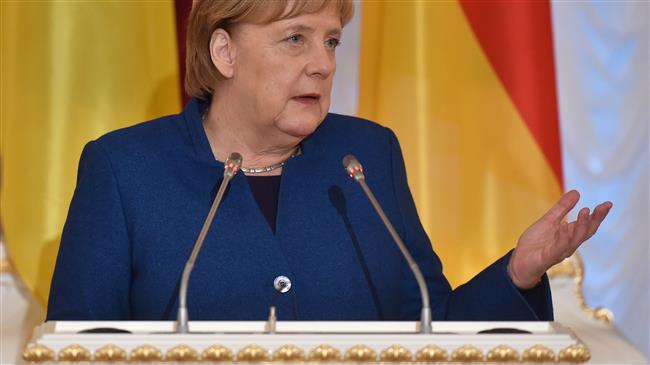Germany's Merkel to press for extension of anti-Russia sanctions over Ukraine
German Chancellor Angela Merkel has announced Berlin’s plans to press for an extension of anti-Russia sanctions by Western nations next month, claiming that Moscow has not implemented the 2015 Minsk truce deal with Ukraine.
“The Minsk agreement is not being fulfilled and we’re only making inching progress if at all and sometimes we’re going backwards,” Merkel asserted on Thursday during a visit to the Ukrainian capital Kiev for talks with President Petro Poroshenko.
“So based on the situation we have today, Germany will push for an extension of the sanctions in December too,” she further added, noting that among the alleged violations of the Minsk peace treaty -- brokered by Germany and France -- were elections planned in areas controlled by pro-Russia forces for November 11.
The conflict in eastern Ukraine began in April 2014 after Russian and Western nations, led by the US, faced off in a political crisis after Crimea’s separation from Ukraine and reunion with Russia, which took place after a referendum.
Since then, international efforts to restore peace and stability to the Russian-speaking region have failed and more than 10,000 people have died in clashes between pro-Russian forces and the Ukrainian military.
Western countries accuse Moscow of supporting pro-Russia forces in the region, a charge the Kremlin denies.
Meanwhile, Russia announced sanctions against senior Ukrainian officials as well as business and cultural figures, including former prime minister Yulia Tymoshenko, who is the leading presidential candidate in Ukraine’s 2019 elections. The measures were seen as counter-sanctions after Ukraine targeted Russian officials and businesses earlier this year.
The move came a week after Russian President Vladimir Putin signed a decree allowing punitive measures against Ukraine in response to sanctions by Kiev against individuals and legal entities in Russia.
Russia’s Prime Minister Dmitry Medvedev announced a list of 322 names on Thursday – including the son of the Ukrainian president – and 68 companies that would be barred from doing business in Russia and whose assets would be blocked if they had any in the country.
Moscow also sanctioned leading Ukrainian security officials. Among them were Ukraine’s right-leaning Interior Minister Arsen Avakov, the head of Ukraine’s national security and defense council, Oleksandr Turchynov, and the head of Ukraine’s SBU security service, Vasyl Hrytsak.
Moscow’s measures were seen as counter-sanctions after Ukraine targeted Russian officials and businesses earlier this year.
This is while the Kremlin has sought ways to respond to foreign sanctions, described by President Vladimir Putin and other top Russian officials as economic war.
While relations between Russia and Ukraine have collapsed since 2014, the countries remain important trading partners. Some of the sanctions appeared designed to target Ukrainian exports such as metals, poultry and sunflower oil.
Tel Aviv tells Damascus Israeli forces will remain in occupied territory: Report
Dec. 22: ‘Axis of Resistance’ operations against Israeli occupation
‘Abhorrent’: Oxfam says only 12 trucks delivered aid in North Gaza since Oct.
VIDEO | Leader receives religious eulogists on Hazrat Fatima birth anniv.
Pope Francis slams Israel’s ‘machine-gunning’ of Gaza children
US hostage-taking of Iranian nationals violation of intl. law: Deputy FM
VIDEO | Carol Singers for Palestine on London’s Parliament Square
Ansarullah says ‘Israeli terrorists’ incapable of confronting Yemen, warns of secret weapons














 This makes it easy to access the Press TV website
This makes it easy to access the Press TV website